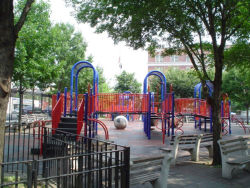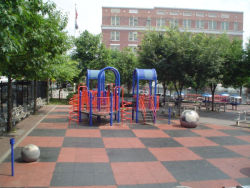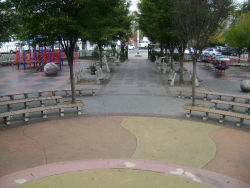Galileo Playground
Galileo Park
Galileo Galilei was born near Pisa on February 15th in 1564 - the same year in which Shakespeare was born, and in which Michelangelo died. The son of Giulia Ammannati and Vincenzo Galilei, Galileo Galilei studied at the University of Pisa where he served as Chair of Mathematics from 1589 to 1592. Galileo was then appointed to the Chair of Mathematics at the University of Padua where he stayed until 1610. It was during his time in Padua that Galileo performed experiments on acceleration, invented the microscope, built a telescope, and made the celestial observations for which he is best known. Conventional wisdom of the time followed Aristotle's theory that heavier objects fall faster than light ones. Tradition has it that Galileo performed an experiment in which he dropped objects of differing weights from the tower of Pisa. Galileo's observation that the objects hit the ground simultaneously helped disprove Aristotle's earlier claim. Using his handmade telescope, Galileo made discoveries about the nature of the moon's surface, the composition of the Milky Way, the satellites of Jupiter, and the motion of the planets.
Galileo was persecuted for publishing his observation that our neighboring planets rotate around the Sun, rather than around the Earth as his contemporaries believed. In 1632 he was called to Rome in order to appear before a tribunal on the charge of heresy and compelled to recant his statements that the sun was the center of the solar system. His life was spared, but he was forced to spend the remainder of his days under house arrest. Galileo died at his home on January 8, 1642.
Galileo Park, formerly Macombs Park, is located in Morris Heights in the west central Bronx. Formerly a vacant lot, the land for the playground was assigned to City of New York / Parks & Recreation on December 30, 1993. Construction of the new playground was completed during the Fall of 1999. The $1.8 million project included landscaping, a solar-theme education area, two pieces of play equipment, and a spray feature.
The decoration recalling Galileo's life is inspired by the site's natural rock formation, which offers an ideal stargazing location for today's young explorer. Twelve engraved granite plaques highlight significant dates and accomplishments in his life. The spray shower features constellations that Galileo is sure to have observed through his telescope, and concrete planets recreate our solar system.
Check out your park's Vital Signs
Clean & Safe
Green & Resilient
Empowered & Engaged Users
Share your feedback or learn more about how this park is part of a
Vital Park System




